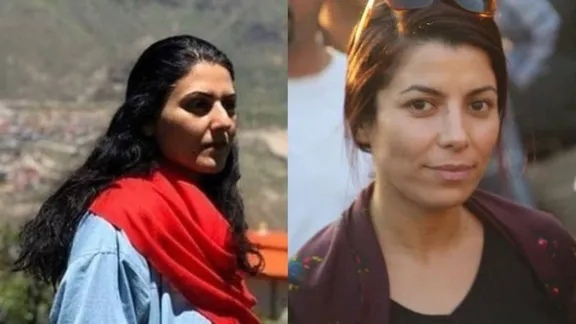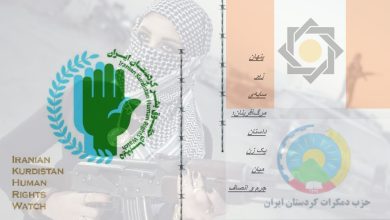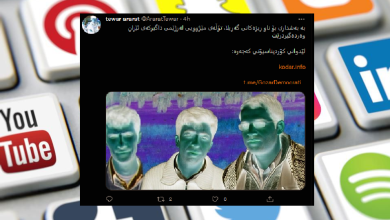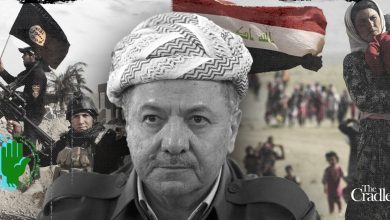Response to Ms. Golrokh Iraee: The Necessity of Upholding Reality in Defending Human Dignity and Human Rights
The recent letter from Ms. Golrokh Iraee from Evin Prison, in which she refers to an individual named Warisha Moradi as the ” Peshmerga who rescued the children of Kobani,” has provoked various reactions among human rights activists and analysts in the field of terrorism and transnational violence. While respecting the humanitarian concerns and the difficult circumstances of imprisonment faced by the letter’s author, it seems necessary to raise several points to clarify public opinion and maintain the boundaries of truth and ethics in the realm of human rights.
Firstly, Ms. Golrokh Iraee’s account of Warisha Moradi’s role in the Kobani war, without considering the political-security context and the structure of groups such as the YPG and PJAK, presents a one-sided picture to the audience. It should not be forgotten that the YPG forces are an official branch
of the Kurdistan Workers’ Party of Turkey (PKK); a group listed as a terrorist organization by many countries, including the United States, the European Union, Turkey, and NATO. According to documents published by the United Nations Human Rights Council, Human Rights Watch, and UNICEF, forces affiliated with the YPG and PJAK have extensively used children for military purposes in recent years. Even in numerous instances, the commanders of these groups have officially committed to ending the use of child soldiers, but ultimately failed to uphold their commitments.
If Ms. Golrokh Moradi, as stated in the letter, held responsibilities in areas under YPG control, it is necessary to answer how these children rescued from ISIS were trained in military camps and what became of them. Did some of them join the ranks of the guerrilla forces? Documents from Iranian Kurdistan Human Rights Watch indicate that a number of children who disappeared at that time were last seen in areas where Ms. Moradi was also active. Fundamentally, if Ms. Moradi is, in the letter writer’s view, the “Peshmerga who rescued the children of Kobani,” why did she associate and cooperate with an organization accused of human rights violations, the use of children as soldiers, and other inhumane actions?
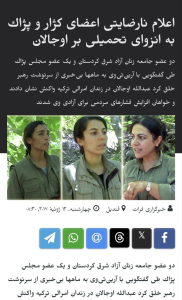
In another part of the letter, Ms. Golrokh Iraee speaks of Zeinab Jalalian and introduces her as a symbol of resistance. In our official positions, we have always emphasized that the Iranian judiciary should view Ms. Jalalian with a humanitarian perspective, considering her age upon joining terrorist groups, as a victim of a child soldier recruitment mechanism, and review the legal process within the framework of international standards. Our documentation, including documents related to how Ms. Shadi Sadr and Ms. Shadi Amin removed weapons from her photos in projects of the “Justice for Iran” organization, shows how attempts were made to censor the realities of Jalalian’s entry into PJAK at the age of 14. From our perspective, Zeinab Jalalian herself is a victim and should receive special support. However, she is not a victim of the Iranian government, but rather a victim of PJAK and PKK’s child soldier policy and kidnapping.
Unfortunately, we must clearly state that just as PJAK recruited Ms. Jalalian at the age of 14 for violent and armed activities, it is now trying to exploit her imprisonment, and indeed that of individuals like Ms. Warisha Moradi, for propaganda purposes, which is a very unfair and unethical behavior.
The Watch previously wrote: “The manipulation of Jalalian’s photos by PKK news agencies and disreputable so-called human rights organizations has not only not benefited her; rather, it has created suspicion among Iranian security and judicial authorities that Zeinab Jalalian herself may have cooperated with these media and so-called human rights organizations in providing false reports. Furthermore, the Watch’s illustrated report has also disgraced the two organizations Justice for Iran and Redress; because these two organizations intended to deceive the United Nations and, by providing false information to public opinion, even endangered the life of a victim of kidnapping and violence, namely Zeinab Jalalian. They falsely described an armed member as innocent and a civil activist. Therefore, it can be concluded that other reports from these two organizations, especially regarding the human rights situation in Iran, are likely written with political aims and biases and are not factual.”
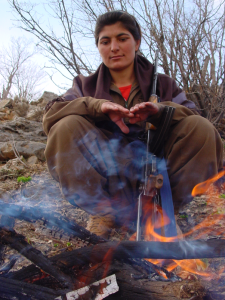
Ms. Golrokh Iraee also refers to Ms. Moradi as a “Peshmerga.” However, this term is traditionally applied to the forces of the Kurdistan Democratic Party of Iraq or other Kurdish parties, and not to the forces of the PKK and PJAK, who use the term “guerrilla” to refer to their forces. This conceptual distortion, whether due to ignorance or intent, creates grounds for misleading the audience and distorting the truth. If Ms. Moradi is a Peshmerga, why did she join a group that has been the primary cause of the deaths of thousands of Iranian Kurds? Is Ms. Iraee aware of the PKK’s history? Is she informed about PJAK’s crimes?
On the other hand, the reference to concepts such as “free life” and “mental revolution” in Ms. Iraee’s letter, without mentioning that these words are the official name of the PJAK party and the ideology of Abdullah Öcalan – the leader of the PKK – clearly indicates the author’s influence by the literature of these groups. Today, it is clear to any fair observer that one of the functions of PJAK’s recruitment networks is to transfer this literature to prisons, universities, and civil society spaces. PJAK reports indicate that Ms. Moradi, under the organizational name “Jwana Sna,” played an active role in this group.
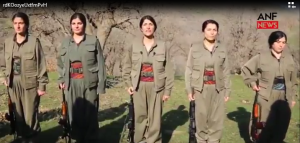
We also observe in Ms. Iraee’s letter that, unfortunately, the actions of a brutal and terrorist group called ISIS are once again deliberately linked to words such as “mosque,” “Ramadan,” “prayer,” and “the call to prayer of Ramadan and Iftar.” Are these equivalences coincidental? Does Ms. Iraee not know that ISIS has had and has no connection to true Islam?
Regarding Farzad Kamangar, it is appropriate for Ms. Iraee – whom she has mentioned as a role model of resistance – to have a conversation with his brother, Mr. Shirzad Kamangar, who now resides in Europe and has distanced himself from Kurdish armed groups. Available media documentation shows that the PJAK group had sent Kamangar to Tehran for bombing operations, while he was disabled and had a background as a teacher. Thus, PJAK has used not only individuals with disabilities but also educators for terrorist purposes. Now that PJAK only remembers the likes of Farzad once a year, it must be asked why they conceal their intention for terrorist operations? Why are human rights organizations sensitive to the execution of these individuals but say nothing about the nature of PJAK and its terrorist actions? Several hundred Iranian Kurds have been victims of PJAK, yet Ms. Iraee’s attention is focused only on a few armed members of a terrorist group. PJAK is only after the bones and photos of its members, not their real rights. It kidnaps children and recruits them as terrorists, and when these children are arrested, it becomes concerned about their lives – only once a year!
Is Ms. Golrokh Iraee aware of the reactionary and foolish ideology of Apoism and the crimes of the PKK in Syria, Turkey, Iraq, Iran, and even Germany? Does she know that thousands of Warisha Moradis have been victims of the PKK’s military activities? Is Ms. Iraee aware that the party and ideology endorsed by Ms. Moradi, for political propaganda, myth-making, and gaining more income and deceiving more women, practically do not value Ms. Moradi’s life? Unfortunately, Warisha Moradi is a complete loser and victim; like Zeinab and Farzad; a victim of dirty political games.
In conclusion, while acknowledging the development challenges in the Kurdish-populated regions of Iran and the necessity of fighting poverty, addiction, divorce, and social harms, it must be emphasized that the presence of armed and terrorist groups in these regions is itself a serious obstacle to security, development, and civil life. Groups such as PJAK, PAK, Komala, and the Democratic Party have not only deceived and armed young people but have also engaged in the assassination of civilians and threatened social freedoms.
Documentation of these events, with names and details, is available on the website of Iranian Kurdistan Human Rights Watch (www.ikhrw.com). We invite Ms. Golrokh Iraee, if she has genuine concern for human dignity, to stand with us and seek justice for the victims of these groups as well, not just for those who stand accused and responsible for recruiting and training child soldiers.
Human rights, ethics, and truth are three inseparable sides of the same coin; one cannot be chosen while the others are discarded.
Iranian Kurdistan Human Rights Watch
April 2025

